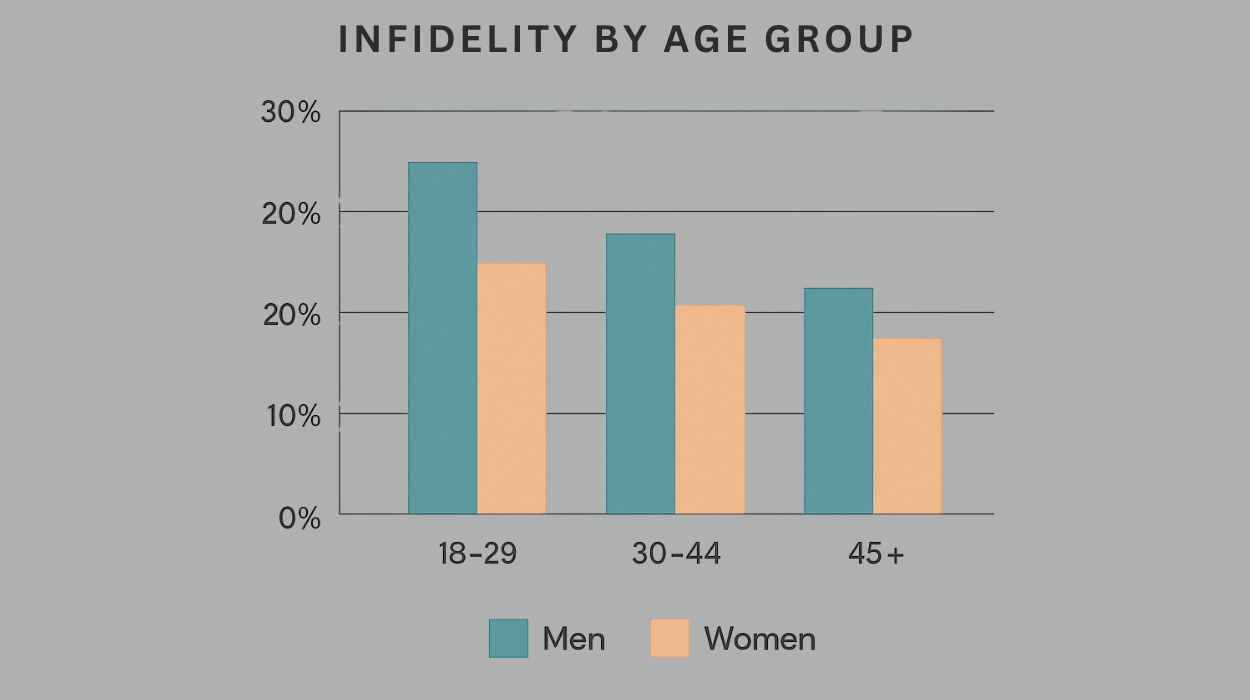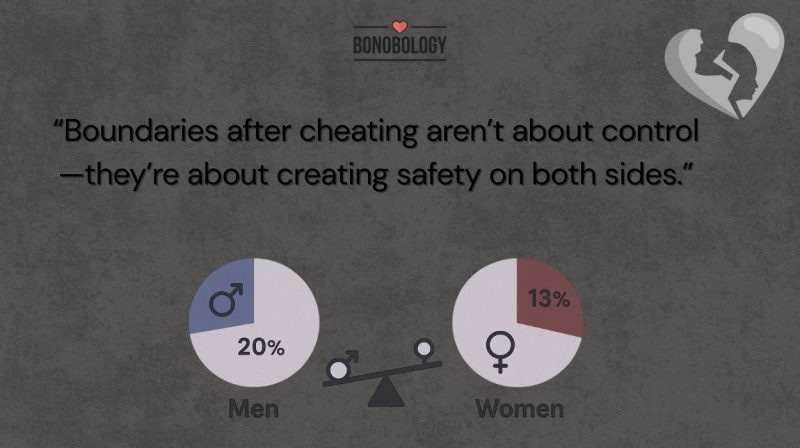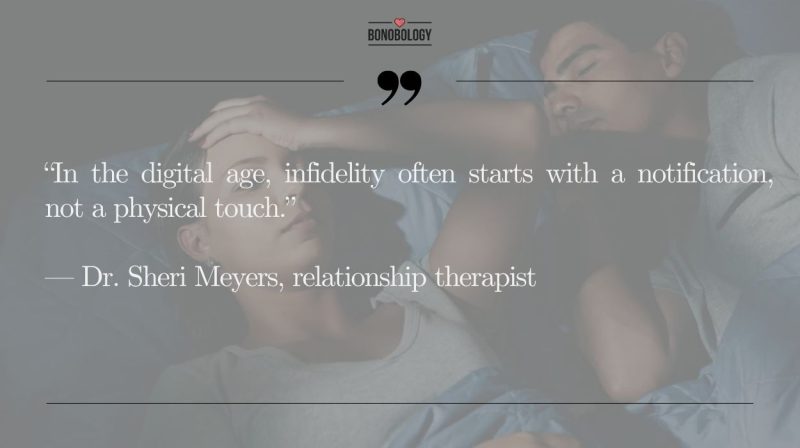At Bonobology, we’ve spent years exploring the unspoken complexities of love and romantic relationships. One recurring theme in our research and reader conversations is infidelity, why it happens, how it hurts, and what it says about modern relationships. This article brings together the latest statistics, expert opinions, and community insights to unpack one of the most divisive relationship questions of all time: Who cheats more—men or women? And more importantly, what does that answer really mean?
Infidelity Statistics: What You Should Know
Table of Contents
Understanding how common is cheating in committed relationships requires a closer look at infidelity rates from multiple sources. By breaking down statistics on cheating across gender lines, this section aims to shed light on how many men cheat, what percentage of women cheat, and whether men cheat more than women, not just to assign blame, but to understand relational behavior more clearly.
We’ve scoured some of the most recent research, studies, and real-life stories to bring you a snapshot of what infidelity really looks like today. From hard-hitting numbers to emotional insights, here’s everything you need to know before jumping to conclusions about who cheats more, men or women. Let’s face it, cheating hurts. And whether you’ve been through it or just fear it, one question always lingers in the back of the mind: who cheats more, men or women?

For decades, the stereotype has pointed fingers at men. And while there’s some truth to that, the full picture is far more layered. A 2022 report from the Institute for Family Studies revealed that 20% of married men and 13% of married women in the U.S. admit to cheating. These numbers give us a clearer picture of how many men cheat and what percentage of women cheat and show that infidelity rates aren’t as one-sided as we think. However, younger age groups tell a different story: among people under 30, the rates are nearly identical. The General Social Survey (GSS) consistently reports that men are more likely to cheat, but the difference is shrinking.
Related Reading: When Do Cheaters Realize They Made A Mistake? 10 Scenarios
Across the globe, the trend holds. A YouGov UK study found that 1 in 5 men and 16% of women have cheated in a committed relationship. In Canada, the Archives of Sexual Behavior reported that men often cheat for physical reasons, while women are more likely to cheat for emotional ones. An Australian study from the University of Queensland reported that 36% of people in long-term relationships have cheated at least once, reinforcing how common affairs are today.
So, do men cheat more than women? Statistically, yes but emotional affairs, which are harder to track, are more common among women. And that kind of betrayal? It cuts just as deep.
Infidelity by age group

Infidelity isn’t confined to a particular life stage. Instead, cheating patterns evolve across age brackets, influenced by emotional maturity, life pressures, and shifting relationship needs. Younger adults may engage in infidelity due to impulsivity or exploration, while older age groups often report affairs rooted in emotional dissatisfaction or unmet needs within long-term partnerships. The data reflects how motivations and risks change over time. Infidelity rates vary significantly across different age groups:
- Ages 18–49: Approximately 11% of women and 10% of men report having cheated
- Ages 50–59: This group exhibits the highest infidelity rates, with 28% of men and 17% of women admitting to cheating
- Ages 65 and older: Infidelity remains notable, with 18% of men and 11% of women reporting affairs
These statistics highlight that infidelity is not confined to a specific age but varies throughout different life stages.
Related Reading: Should You Forgive A Cheater? 8 Factors To Consider
Infidelity by relationship type

Not all relationships operate under the same rules and cheating often reveals the vulnerabilities within each type. Infidelity rates tend to differ significantly between married couples, cohabiting partners, and those in open relationships. These variations suggest that the structure, communication norms, and emotional boundaries within a relationship greatly influence the likelihood of betrayal. Understanding how context affects commitment can offer deeper clarity into why infidelity happens—and to whom. The nature of the relationship also influences infidelity rates:
- Cohabiting couples: Infidelity is more prevalent among cohabiting individuals, with 20% of cohabiting women reporting secondary sexual partners, compared to 4% of married women.
- Open marriages: While open marriages are based on consensual non-monogamy, they are not immune to issues. Studies indicate that 80% of couples in open marriages experience jealousy related to their extramarital relationships, which can lead to conflicts and potential infidelity beyond agreed boundaries.
These insights underscore the complexity of infidelity across different relationship structures.
Related Reading: Is Marriage Never The Same After Infidelity?
“My boyfriend swore he never touched her, but I read the messages. I don’t know what hurts more—the lies or the fact that he told her things he never told me.” — u/PrettyPenny621
Healing After Infidelity: Can You Move Past the Cheating?
Moving forward after infidelity can be incredibly difficult, not only because of the betrayal itself, but because of what it takes to truly rebuild what was broken. A study in the Journal of Sex & Marital Therapy found that about 60% of couples attempt to stay together after cheating. However, rebuilding trust, navigating forgiveness, and deciding whether to stay or leave is a journey that varies from couple to couple.
Renowned psychotherapist Esther Perel notes, “Infidelity hurts, but it also uncovers what wasn’t being said or met in the relationship.” With that in mind, healing is rarely a straightforward process. Below are four key emotional hurdles and how couples might work through them.
1. Rebuilding trust after cheating

Rebuilding trust is often cited as one of the most difficult parts of recovering from infidelity. When infidelity rates are examined closely, it becomes clear why: trust is the foundation of any relationship, and once broken, it challenges the emotional safety needed to move forward. Despite this, many couples do manage to stay together. Statistics on cheating show that a significant percentage of relationships that work after cheating is tied to how well trust is rebuilt. Some key factors that help:
- Daily consistency and accountability help partners feel seen and reassured
- Open communication, even when it’s uncomfortable, is essential to restoring emotional intimacy
- Voluntary transparency, such as sharing digital access, signals honesty
- Fulfilling commitments, both small and large, proves reliability over time
“Every day he checked in—no lies, no dodging. That’s how I knew he was serious about earning me back.” — r/BreakUps
1. Setting boundaries that didn’t exist before
Cheating often reveals a lack of clarity around personal and relational boundaries. Given how common affairs are in various relationship settings, this stage becomes essential in defining what both partners are comfortable with going forward. Setting firm emotional, digital, and social boundaries becomes a structural step in rebuilding trust. Examples include,
- Limits on contact with certain individuals, especially if the betrayal involved a specific person
- Transparency on digital platforms, where suspicion often festers
- Agreements around time and emotional availability that reinforce security
- Space to process grief without being rushed into false resolution
These boundaries work best when mutually created, not enforced unilaterally

2. Is forgiveness the same as reconciliation?
In the aftermath of infidelity rates, many people confuse forgiveness with reconciliation. But the two are very different. Forgiveness is an internal process. One that helps the betrayed partner release anger, resentment, and pain. Reconciliation, on the other hand, requires both partners to actively rebuild their relationship. It’s a mutual commitment to working through the damage.
Important distinctions:
- A partner may forgive without ever resuming the relationship
- Reconciliation requires accountability, vulnerability, and active effort from both sides
- True reconciliation is impossible without mutual emotional safety
Not all forgiveness leads to reconciliation, and not all reconciliations are healthy. It’s essential to differentiate between personal healing and the decision to continue the relationship.
“I never thought I’d be the one to cheat. But years of feeling emotionally ignored made me want to feel seen again.” —
r/psychologyresearch
3. When to get professional help

Considering how common is cheating and the emotional upheaval it causes, many couples benefit from professional guidance. Therapists offer structure and neutrality, especially when betrayal has triggered long-standing patterns of conflict. Among the statistics on cheating, it’s notable how many couples who seek therapy report progress in either reconciliation or healthy separation.
Related Reading: Understanding Post-Infidelity Stress Disorder – Signs and Recovery Tips
Couples therapy provides structured support and a neutral environment where both individuals can express their feelings and work on solutions. It can be particularly helpful in clarifying whether rebuilding the relationship is realistic or whether parting ways would be more constructive. Some challenges are too complex to untangle without support. A licensed therapist can help couples:
- Navigate emotional triggers
- Communicate without blame
- Clarify whether staying or leaving is healthiest
- Rebuild intimacy and safety over time
Whether attending individually or as a couple, therapy creates a structured space to explore painful truths and potential futures.
“Infidelity hurts, but it also uncovers what wasn’t being said or met in the relationship.”
— Esther Perel
FAQs
1. Who cheats more, men or women?
Overall, more men cheat than women. Approximately 20% of men versus 13% of women in marriages have admitted to infidelity. However, younger women are narrowing that gap, especially in emotionally unfulfilling relationships.
2. How common is cheating in marriage?
Cheating is more common than most people assume. About 1 in 5 married men and 1 in 8 married women report being unfaithful at some point in their relationship. Affairs are even more common in long-term, unaddressed conflict zones.
Key Pointers
- 60% of couples stay after cheating but staying is just the beginning. True recovery comes from mutual effort, accountability, and a shared desire to heal
- Therapy isn’t a last resort, it’s a lifeline. Couples who seek professional help often rediscover tools for communication, empathy, and emotional safety
- Letting go can be its own kind of healing. Not every relationship survives infidelity and that’s okay. Walking away can be the bravest and healthiest choice when trust can’t be rebuilt
- Forgiveness doesn’t mean forgetting. It means choosing peace over punishment for yourself first, and possibly for your partner too
- Boundaries become your backbone. They’re not restrictions, but reinforcement of clear lines that help both people feel emotionally secure moving forward
Final Thoughts
The question of “who cheats more men or women” doesn’t have a one-size-fits-all answer. Yes, statistics show men cheat more often—but the difference is shrinking. More importantly, the reasons behind infidelity are often rooted in emotional neglect, lack of communication, and unmet needs.
Rather than focusing solely on gender differences, it may be more helpful to explore what leads people to cheat in the first place. Because when we understand the why, we’re better prepared to prevent the what. Whether you’re healing from betrayal or trying to safeguard your relationship, honesty and empathy are always the best place to start.
18 Promising Tips To Survive Infidelity In A Relationship — For The Betrayer And The Betrayed
The 7 Stages Of Emotional Affairs: Reasons And Tips To Recover
Your contribution does not constitute a charitable donation. It will allow Bonobology to continue bringing you new and up-to-date information in our pursuit of helping anyone in the world to learn how to do anything.






















Featured
19+ Most Commonly Used Cheating Apps For iPhone
11 Heartbreaking Signs He Loves His Side Chick
11 Apps for Cheating Husbands—Catch Him Red-Handed
When Do Cheaters Realize They Made A Mistake? 10 Scenarios
5 Best Cheating Spouse Tracker Apps (Android & iPhone)
How To Catch A Cheater That Deletes Everything: 12 Hacks
33 Signs Of Micro-Cheating — Is Your Partner Guilty Of These?
7 Therapist-Approved Things To Do If Your Boyfriend Is Cheating On You
11 Heartbreaking Signs Your Husband Misses His Affair Partner
Should You Forgive A Cheater? 8 Factors To Consider
How Can You Tell If Your Fiancé Is Cheating? 15 Signs To Look Out For
Is Marriage Never The Same After Infidelity?
13 Uncommon Signs of Cheating People Wish They Hadn’t Ignored
15 Cell Phone Cheating Signs That Confirm Infidelity
Gut Feeling He’s Cheating, No Proof? 31 Signs Your Instincts Are On Point
Monkey Branching: Meaning, Signs, And Ways To Deal
Painful Message To A Cheating Boyfriend: 50 Brilliant Ideas
Is Flirting Cheating? 9 Reasons It Is And 7 Ways It Can Harm Your Relationship
What To Do If You Suspect Your Husband Is Cheating But Have No Proof
Understanding Post-Infidelity Stress Disorder – Signs and Recovery Tips